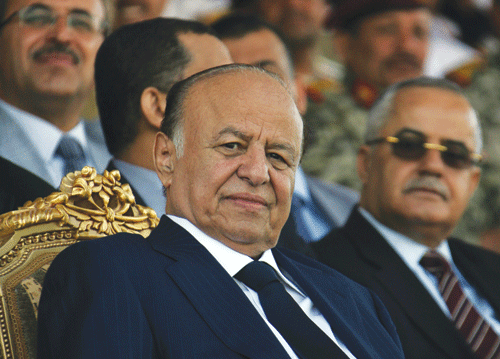Yemen’s current president — formerly the quiet, powerless vice president — took office more than eight months ago, yet until recently those walking near his home would still say they were “near the vice president’s house.” Few took him or his new authority seriously. That, however, has now changed. Not only has Abdu Rabbu Mansour Hadi earned respect as a leader, he has aroused something many Yemenis had almost become allergic to, given how often it has let them down: hope.
Hadi came to power in February via a political deal brokered and backed by Gulf Cooperation Council states and the international community, which helped end more than a year of popular uprisings against the three-decade rule of Ali Abdullah Saleh. Few, however, thought Hadi could curb the heavy influence of the patronage networks and corrupt feudal systems that were the legacy of the former president.
Early August, however, President Hadi began a military reshuffling, removing key units from the command of Saleh’s son and a former Saleh ally, who headed the Republican Guard and the first Armed Division, respectively. This was welcomed as a step towards a comprehensive reconstruction of the army, which was one of the revolution’s main goals. To Saleh and his old friends, it was a medium-sized earthquake. A bigger shake-up came mid-September when Hadi targeted numerous governors, security officials and ministers for removal. Among these was the former head of National Security Ali al-Ansi, who had been Saleh’s most powerful ally behind the scenes. Yemen’s ‘National Security’ agency, like every dictator’s ‘intelligence department’, had been in charge of countering ‘terrorism’ and ‘anti-Saleh’ movements.
Hadi is the first president in Yemen’s history to take office with this level of local and international support, as well as having reached the presidency independently of the traditional political and tribal ladders. Since he was elected on February 21, he has surprised almost everyone with his intelligent use of power, while speaking publicly very infrequently and leaving traditional stakeholders on edge as to his next move. Before his election Hadi had the reputation as the weakest man in Yemen — today, after sacking air force commanders, southern district leaders and, equally importantly, civic leaders who were part of Saleh’s patronage networks, and doing so with utmost calm, one retired army officer said, “He is like a tank, very slow but very strong.”
Aside from military issues, Hadi established the Preparatory Committee for the National Dialogue, where Yemenis of all stripes will meet to negotiate the new Yemen they want for the future, and attempt to solve the country’s most critical conflicts and issues. President Hadi was also scheduled to be in New York last month to meet United States President Barack Obama and make the case for international aid at the ‘Friends of Yemen’ meeting.
At the same time, these successes Hadi has been enjoying need to be placed in the context of the massive challenges Yemen faces. Almost concurrently with the August sackings, a suicide bomb targeted one of the most secured areas in the capital, around the prime minister’s office. The attack — thought to have targeted the Minister of Defense who has already survived five assassination attempts in the last 6 months — killed 10 civilians, injured six of the minister’s guards, and underlined the fragility of the country which Hadi is trying to lead.
The hope that the new president has generated is also founded on people having had such low expectations when he came to office. The deal replacing the president was aimed at preventing all-out civil war — anything more than that is icing on the cake.
And while Al Qaeda in the Arabian Peninsula (AQAP) has suffered substantial losses so far during Hadi’s term, the group seems to have changed to strategies similar to Al Qaeda in Iraq, employing hit-and-run tactics and suicide bombings, successfully assassinating top military leaders, including the head of the army’s southern division. Abyan, Hadi’s home province, is still yet to see the return of the tens of thousands who fled the heavy fighting between AQAP and the army. Add to this that the secession movement in the south is gaining traction, while Sada, among other governorates, still remains outside government control. And then there’s the country’s massive food crisis, where almost half of Yemenis don’t have enough to eat.
Thus, it is safe to say that President Hadi is not likely to be ‘The Savior’ of Yemen, but for all the terrible news coming from the country, he is at least a step in the right direction.








